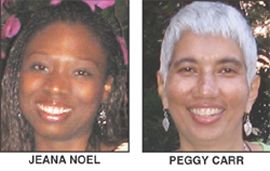LIFE IN TAIWAN: The Vincentian Experience

by Jeana Noel
There are about a dozen Vincentians currently residing in Taiwan. Most of them are students on Taiwan diplomatic scholarships. Others are living and working there. For those who have not been to Taiwan, it may be difficult to imagine what living in Taiwan is like. There really is no word to describe it. It’s just different in every way imaginable; language, people, food, lifestyle, attitudes, and culture in general. But in spite of all these differences and the adjustments that have to be made, Vincentians living in Taiwan find the experience valuable. {{more}}
Vincentians have different reasons for choosing Taiwan. Take Peggy Carr, an editor at one of Taiwan’s English newspapers, for instance. She has been in Taiwan off and on for the last five-and-a-half years. She had visited Taiwan twice to attend seminars while she was working for the government of St. Vincent and the Grenadines. Now she has settled there and likes working and living in Taiwan. “I like the businesslike attitude of the people, the fact that one’s ability and expertise are mainly what count. This is the kind of environment in which I had always wanted to work. Everything is readily and easily available in Taipei. Public transportation is cheap and convenient; one can find a 24-hour convenience store on practically every corner; there are 24-hour supermarkets, drugstores, restaurants, food stands, massage parlours – you name it.”
Getting used to life in Taiwan is not so easy, and attitude may be the little difference between those who can adjust and those who cannot. The first few days and weeks can be very taxing. Consider, for instance, that at any one time, you could be anywhere and be the only foreigner, more often than not, the only black person. At times like these, the street, the train, the convenience store, the restaurant – just anywhere you are is transformed into a virtual museum where you are the main exhibit! While waiting to cross at the traffic light, almost everyone passing on their motorcycles and in their vehicles would cast more than a casual glance in your direction. The group of high school students next to you would be talking to each other in hushed voices, and people, both children and adults, would point you out to their companions. It wouldn’t help that you have no idea what they are saying. If you have a positive attitude though, you dismiss all this taking into account that non-Asian foreigners in Taiwan (especially blacks) are so few that just seeing one creates a stir. And, if you learn anything from the experience, you go away resolving not to react in this way to foreigners in your own country because you know how uncomfortable it can make them feel.
After a few months, you get used to the attention and sometimes it even goes unnoticed. Even better, you might get a sense of satisfaction and amusement from being able to understand some of the comments being made about you, which are not all bad. The high school students just might be daring each other to speak to you in English, none of them brave enough to take up the task. Women may be admiring your “great figure”, or simply expressing bewilderment at your braided hair and wondering if you were born that way!
How do Vincentians get used to a language as complex and as different from English as is the case with Chinese? Put simply, Chinese study requires a lot of time and effort. As Vashti Carr points out, Chinese is a difficult language. She has been studying for two years and plans to continue for another year. “After studying for two years I’m just now feeling as if I’m actually learning something. I can understand the basics of what someone is saying to me in Mandarin and reply.”
Seab Anthony, one of the Vincentian students on scholarship, has been in Taiwan for ten months, during which time he has been studying Chinese. He feels that having an open mind and being ready for new adventures makes it easier for him to adapt to the language and culture. “I realize I have a gift for language and have been working hard to learn as much Chinese as I can. Going to church and speaking to old people, little children and females were a few of the factors that led me to learn an extraordinary amount of Chinese in a short space of time.”
In spite of this, he sees some difficulties ahead. “The challenge is ahead when I begin university and will be dealing with professional language from the more esoteric of subjects, and not, for example learning how to order food in a restaurant. Seab will begin to pursue studies in Power Mechanical Engineering at National Tsing Hua University in September.









